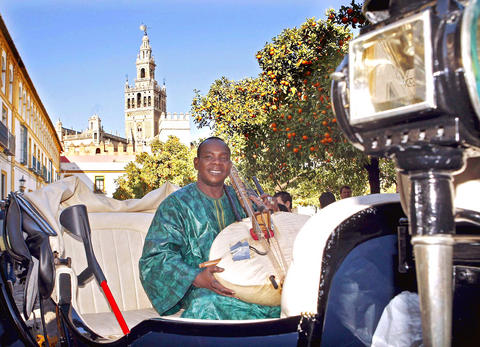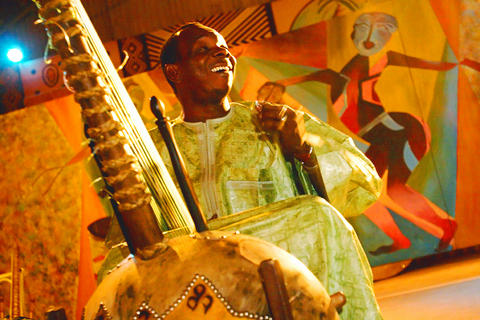Toumani Diabate is sitting under a tree in his moonlit front garden, down a dusty dirt road in Bamako, the Malian capital. He is picking out a melody on the kora, the West African harp of which he is a master, and talking about what it means to be descended from a long line of professional hereditary musicians, known as griots. "The first role of the griot is to make communication," he says. "The griots are like an archive. They know the histories and the stories. I'm playing a griot instrument and taking it outside Africa."
Diabate has devoted his life to demonstrating the versatility of the kora - and it has made him a global celebrity. He has performed with Bjork at Glastonbury, UK, ("I didn't play her music," he says, "I played my music"); accompanied the Malian diva Kandia Kouyate and recorded both with Spanish flamenco group Ketama and American blues guitarist Taj Mahal. Three years ago, he made the award-winning album, In the Heart of the Moon, with Mali's greatest guitarist, the late Ali Farka Toure, in a mobile studio set up in Bamako's Hotel Mande. A year later, he was in the same studio recording a very different album, Boulevard de L'Independence, this time with his experimental Symmetric Orchestra, a band which places his amplified kora against electric guitar, massed percussion, brass and keyboards. Now he is releasing a new solo album, The Mande Variations, which shows him returning the kora to its traditional roots.
Diabate finds it as easy to talk about the distant past as he does about the present, and sees no clash between the two. So one minute, here in his garden, he is discussing Sunjata Keita - the man who, in the 13th century, founded the great empire of the Mande people that spread from Mali across much of West Africa. The next, he's taking calls on the mobile phone that is his constant companion, talking about the new album and the mystical, spiritual attributes of the kora.

PHOTO: EPA
Diabate can trace his family back 71 generations, to the era of Sunjata - "and they have been musicians all that time." His father, Sidike, was acknowledged as the most influential kora player in Africa, thanks to his skill as both an accompanist and a solo musician. Diabate has expanded that role, determined to show that "there's no limit to what the kora can do."
And yet Diabate insists that his father never taught him to play. "My father was too busy. It was the time of independence [Mali broke away from French rule in 1960], and the president had asked him, my mother - a fine singer - and other musicians to form a national traditional band. So I taught myself, listening to my father and grandfather, and different musicians." His influences include not just the griots and guitar-based African bands like Senegal's Orchestra Baobab, but Jimi Hendrix, Otis Redding, the Scorpions, Bad Company and Pink Floyd. "But music was a gift to me from God," he says.
The kora is constructed from the shell of a large gourd, the calabash, decorated and covered in cow skin; it has a long neck with 21 strings made from nylon fishing line. The instrument is treated with great respect - students at the Bamako conservatory, where Diabate teaches, have to make a ritual offering of kola nuts, "as a sign of respect," before they touch the kora for the first time. Diabate is a devout Muslim, with his own prayer room next to his office, and for him the kora is a "deep and spiritual instrument." He demonstrates how a kora player uses just the index finger and thumb of each hand - in a position that "makes the name of God in the Koran" - but warns that the kora also attracts the mischievous ancient African spirits, the Jinns. "So it's sometimes dangerous to play the kora after midnight in Africa, because the spirits will come, and you can see the Jinns ... . "

PHOTO :AP
A noisy wedding got underway at the Hotel Mande during Diabate's first attempt to record The Mande Variations. So he and his producer, Nick Gold, moved the session to a little studio in Wood Green, North London, where they recorded the album in just two hours. It's a gentle, experimental record, taking in both ancient themes - as on the track Djourou Kara Nany, which, Diabate says, "makes use of a song about Mande history, from Sunjata's time" - and new praise songs, always a crucial part of a griot's repertoire. Two of these are named after London streets that are home to those who have helped his career. One such track, Elyne Road (in honor of Gold and his family) includes echoes of an old UB40 song, "because I remember the melody from when I first came to London."
Diabate's aim with the album is to make western audiences rethink their idea of African music. "Most people think that Africa doesn't have classical music," he says. "They think of Africa as having just dance and percussion - talking drums and calabash - but we have lots of music that's not percussion. People don't know that the kora is a great classical instrument."
But while Diabate sets out to educate Western audiences, he still has the duties of a modern-day griot to fulfill. Late one night in Bamako he performs at the Tamani Awards (Mali's music awards) where he is honored for the "best traditionally inspired music." From there he moves on to the Hogon, the open-air club where he plays every Friday night when he's in Bamako, and has done for 16 years. The dance floor is in semi-darkness, lit only by the moon, a strip of green neon behind the stage, and a few lights behind the bar. The Symmetric Orchestra has been playing for hours by the time Diabate joins them, at nearly 2:30am. He sits at the back of the stage talking on his mobile phone, then joins in, cutting through the massed percussion and electric guitar, improvising on his amplified kora. And the floor fills up with people dancing furiously in the dark.

On April 26, The Lancet published a letter from two doctors at Taichung-based China Medical University Hospital (CMUH) warning that “Taiwan’s Health Care System is on the Brink of Collapse.” The authors said that “Years of policy inaction and mismanagement of resources have led to the National Health Insurance system operating under unsustainable conditions.” The pushback was immediate. Errors in the paper were quickly identified and publicized, to discredit the authors (the hospital apologized). CNA reported that CMUH said the letter described Taiwan in 2021 as having 62 nurses per 10,000 people, when the correct number was 78 nurses per 10,000

As we live longer, our risk of cognitive impairment is increasing. How can we delay the onset of symptoms? Do we have to give up every indulgence or can small changes make a difference? We asked neurologists for tips on how to keep our brains healthy for life. TAKE CARE OF YOUR HEALTH “All of the sensible things that apply to bodily health apply to brain health,” says Suzanne O’Sullivan, a consultant in neurology at the National Hospital for Neurology and Neurosurgery in London, and the author of The Age of Diagnosis. “When you’re 20, you can get away with absolute

May 5 to May 11 What started out as friction between Taiwanese students at Taichung First High School and a Japanese head cook escalated dramatically over the first two weeks of May 1927. It began on April 30 when the cook’s wife knew that lotus starch used in that night’s dinner had rat feces in it, but failed to inform staff until the meal was already prepared. The students believed that her silence was intentional, and filed a complaint. The school’s Japanese administrators sided with the cook’s family, dismissing the students as troublemakers and clamping down on their freedoms — with

As Donald Trump’s executive order in March led to the shuttering of Voice of America (VOA) — the global broadcaster whose roots date back to the fight against Nazi propaganda — he quickly attracted support from figures not used to aligning themselves with any US administration. Trump had ordered the US Agency for Global Media, the federal agency that funds VOA and other groups promoting independent journalism overseas, to be “eliminated to the maximum extent consistent with applicable law.” The decision suddenly halted programming in 49 languages to more than 425 million people. In Moscow, Margarita Simonyan, the hardline editor-in-chief of the